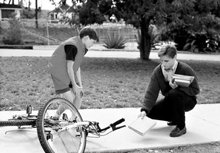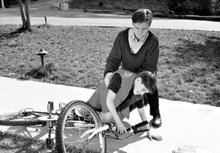An assist carries with it a certain responsibility. A person goes through life and casts his shadow upon many people. You will quite likely find yourself in situations where a stranger would benefit from an assist.
Your approach under these circumstances should be straightforward and positive. Be professional and definite. You don’t even need to ask for permission, just do it. If you are going to help some stranger out, help him out. Don’t stand around explaining to bystanders what you are going to do or waiting for somebody’s permission. If you are at the scene of a commotion and act as though you are the one in charge, you will be in charge. This is
Say, for example, there is a serious accident and a crowd of people are pressing around. The police are trying to push the people back. Well, push the people back and then lean over the victim and give him an assist. If you are enough there, everybody else will realize that you are the one that is there. Such things as panic, worry, wonder, upset, looking dreamily into the far distance, wondering what is wrong or what should be done are no part of your makeup if you are rendering an assist. Cool, calm and collected should be the
Where you are giving an assist to a person, put things in the environment into an orderly state as the first step, unless you need to give immediate first aid.
First aid always precedes an assist. You should look the situation over from the standpoint of how much first aid is required. Maybe you will find somebody with a temperature of 106 degrees who needs to lie down and be cooled off before any assist is done and though antibiotics are much overrated, he might be better off with a shot of these antibiotics than with an assist at that time.
A good example would be a situation where somebody is washing dishes in the kitchen. Suddenly, there is a horrendous crash and the person falls down and hits the floor, but as she is going down, she grabs a butcher knife and cuts her hand. One of the first things you would do is wrap a bandage around her hand to stop the bleeding. Another part of the first aid would be to pick up the dishes and put them back on the sink and sweep the pieces together into a more orderly
Then you would give her an assist. To remove her from the scene of the accident is not as desirable as doing the assist on her there. Perhaps this is contrary to what you believe, but it is true, and is why you bring some order into the environment first. You manifest order in a much wider sphere than a cut hand in order to bring about a healing of the cut hand. If you understand that your responsibility always extends much wider than the immediate zone of commotion, you will be more successful. If you bring order to the wider environment, you also bring it to the narrower environment.
If you know you are going into a zone of accidents and you are going to be in the vicinity of a great deal of destruction and chaos, you would be very foolish not to have first aid training. Keep in mind that you may often have to find some method of controlling, handling and directing personnel who get in your way before you can render an assist. In circumstances such as these, an assist requires that you control the entire environment and personnel associated with the assist, if necessary.
As someone who knows and practices the technology of Scientology, you have every right and responsibility to relieve suffering when you see it. Religion exists in no small part to handle the upsets and anguish of life. These include spiritual duress (hardship) by reason of physical conditions.
Ministers long before Christ’s
The “psych-iatrist” and “psych-ologist” on the other hand took their very names from religion since psyche means soul. They, by actual statistics, are not as successful as priests in relieving mental anguish. But they modernly seek to do so by using drugs or hypnotism or physical means. They damage more than they help.
Those with spiritual knowledge have a responsibility to those about them to relieve suffering. There are many ways to do this without drugs or hypnotism or shock or surgery or violence.
The primary method of relieving suffering is the assist.
As the knowledge of how to do them exists and as the skill is easily acquired, we should not neglect those who will benefit from them.
If you truly want to help your fellows, that exact skill and those results are very well worth having.
an essential, necessary or integral part.
the central or most important point or theme of something.
the outward appearance of something.
any of the early followers of Jesus who carried the Christian message into the world.
condition or state of being; existence. Beingness also refers to the assumption or choosing of a category of identity. Beingness can be assumed by oneself or given to oneself or attained. Examples of beingness would be one’s own name, one’s profession, one’s physical characteristics, one’s role in a game—each or all of these could be called one’s beingness.
hopes, strong desires or ambitions to achieve some goal or objective. The word also means the goal or objective desired.
a temporary or complete stopping.



